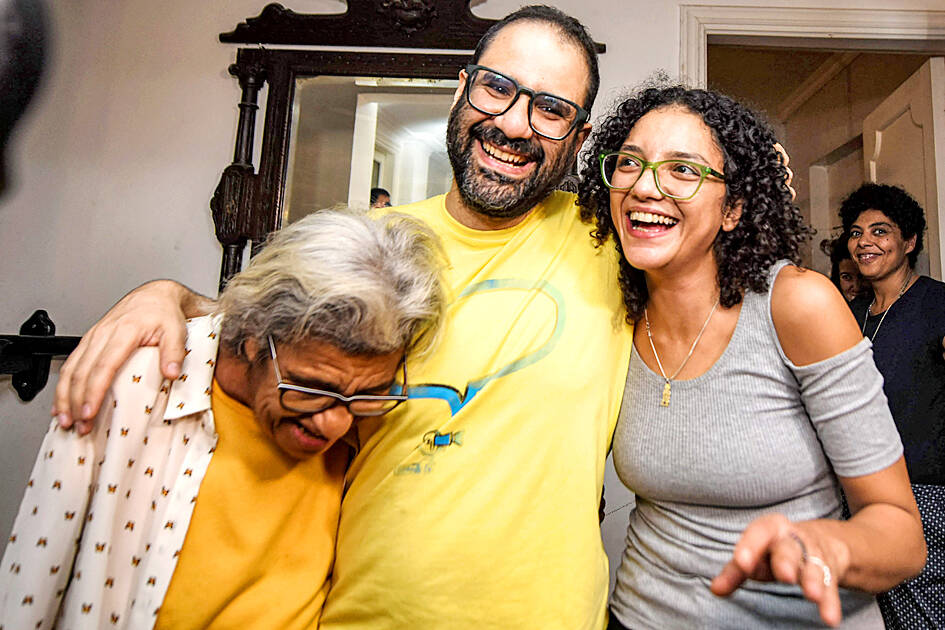Prominent Egyptian-British human rights defender Alaa Abdel Fattah on Monday was released from prison after years behind bars and reunited with his family in an emotional celebration following a long-awaited pardon by Egyptian President Abdel Fattah al-Sisi.
A key figure in Egypt’s 2011 uprising, Abdel Fattah, 43, was released after years of advocacy efforts by family members, rights groups and the British government, with his mother, Leila Soueif, going on hunger strike.
At the family home in Cairo, celebrations went on early into yesterday morning, with Abdel Fattah smiling and jumping for joy as he embraced his mother, sister and friends.

Photo: AFP
“I still can’t believe it and I can’t grasp that Alaa is with us, so I’ll need some time to absorb it,” said his sister, Sanaa Seif, herself a former political prisoner.
“I told my friend that life has returned to us,” she added.
Abdel Fattah had been held at Wadi al-Natrun prison, about 80km from Cairo. Following the announcement of al-Sisi’s pardon on Monday, Abdel Fattah’s family had rushed there to await his release, only to discover he had already returned home.
“Alaa is free” and “Home” read the captions on photos posted on social media by his relatives early yesterday.
Abdel Fattah had opposed every Egyptian administration since the early 2000s, when activists in the country started using social media to express dissent.
He was last arrested in 2019 after sharing a Facebook post about police violence and was sentenced in 2021 to five years in prison for “spreading false news” — a charge frequently brought against dissidents in Egypt.
According to his family, Abdel Fattah still faces a travel ban, despite that he is a British citizen, with his wife and 10-year-old son living in the UK.
“I hope this will mark the end of our difficulties and that Alaa will be allowed to travel and reunite with his son,” Seif said. “I never wish for anyone else to go through what we went through.”

REVENGE: Trump said he had the support of the Syrian government for the strikes, which took place in response to an Islamic State attack on US soldiers last week The US launched large-scale airstrikes on more than 70 targets across Syria, the Pentagon said on Friday, fulfilling US President Donald Trump’s vow to strike back after the killing of two US soldiers. “This is not the beginning of a war — it is a declaration of vengeance,” US Secretary of Defense Pete Hegseth wrote on social media. “Today, we hunted and we killed our enemies. Lots of them. And we will continue.” The US Central Command said that fighter jets, attack helicopters and artillery targeted ISIS infrastructure and weapon sites. “All terrorists who are evil enough to attack Americans are hereby warned

‘POLITICAL LOYALTY’: The move breaks with decades of precedent among US administrations, which have tended to leave career ambassadors in their posts US President Donald Trump’s administration has ordered dozens of US ambassadors to step down, people familiar with the matter said, a precedent-breaking recall that would leave embassies abroad without US Senate-confirmed leadership. The envoys, career diplomats who were almost all named to their jobs under former US president Joe Biden, were told over the phone in the past few days they needed to depart in the next few weeks, the people said. They would not be fired, but finding new roles would be a challenge given that many are far along in their careers and opportunities for senior diplomats can

Seven wild Asiatic elephants were killed and a calf was injured when a high-speed passenger train collided with a herd crossing the tracks in India’s northeastern state of Assam early yesterday, local authorities said. The train driver spotted the herd of about 100 elephants and used the emergency brakes, but the train still hit some of the animals, Indian Railways spokesman Kapinjal Kishore Sharma told reporters. Five train coaches and the engine derailed following the impact, but there were no human casualties, Sharma said. Veterinarians carried out autopsies on the dead elephants, which were to be buried later in the day. The accident site

RUSHED: The US pushed for the October deal to be ready for a ceremony with Trump, but sometimes it takes time to create an agreement that can hold, a Thai official said Defense officials from Thailand and Cambodia are to meet tomorrow to discuss the possibility of resuming a ceasefire between the two countries, Thailand’s top diplomat said yesterday, as border fighting entered a third week. A ceasefire agreement in October was rushed to ensure it could be witnessed by US President Donald Trump and lacked sufficient details to ensure the deal to end the armed conflict would hold, Thai Minister of Foreign Affairs Sihasak Phuangketkeow said after an ASEAN foreign ministers’ meeting in Kuala Lumpur. The two countries agreed to hold talks using their General Border Committee, an established bilateral mechanism, with Thailand